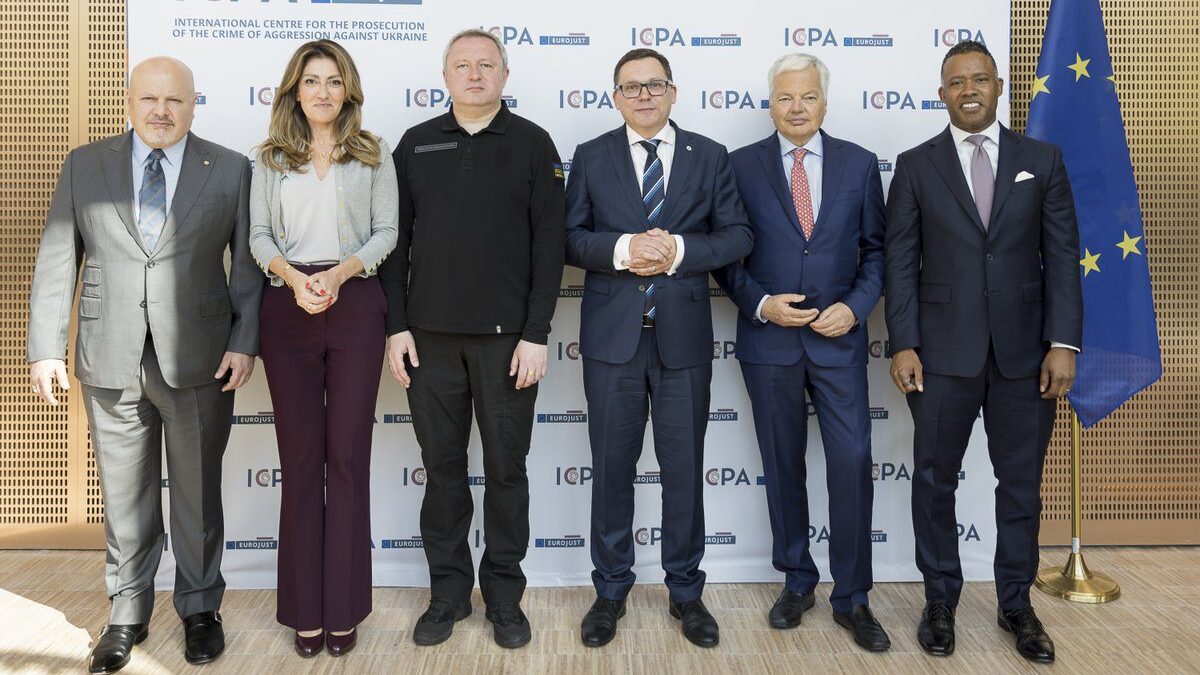
Left to right: ICC Prosecutor Karim Khan, Dutch Justice Minister Dilan Yeşilgöz-Zegerius, Prosecutor General of Ukraine Andriy Kostin, Eurojust’s President Ladislav Hamran, European Commissioner for Justice Didier Reynders and U.S. Assistant Attorney General Kenneth Polite at the ICPM launch in The Hague, July 3rd.
Photo: Eurojust / Twitter
After months of preparations, the International Center for the Prosecution of the Crime of Aggression against Ukraine (ICPA) was finally launched in The Hague on Monday, July 3rd. For now, the goal is building cases against Russia to begin the prosecution of war crimes as soon as the war ends, the EU’s judicial cooperation agency announced.
The ICPA will primarily take on the work of the Ukrainian judiciary, which has already documented 93,000 cases of war crimes and 347 suspects. Kyiv’s work is complemented by the evidence produced by the joint investigation of several European countries, as well as that of the U.S. Department of Justice more recently.
👀We just witnessed history in the making!
— Eurojust (@Eurojust) July 3, 2023
👉Did you?👈
➡️Today's press conference on the International Centre for the Prosecution of the Crime of Aggression in #Ukraine (#ICPA) launch⚖️
🎥 (Re-)Watch it here:
👇https://t.co/Wex2M9lbUe pic.twitter.com/9mg93IJaiz
As we reported before, the ICPA was announced back in early March as a first step to solve the apparent legal shortcomings of the International Criminal Court (ICC), namely that it can’t prosecute Putin and his allies because it doesn’t have jurisdiction over Russia as the country withdrew from the ICC Treaty in 2016.
In March of this year, seven partner countries of Eurojust (European Agency for Criminal Justice Cooperation) created the so-called Joint Investigation Team (JIT) with a special mandate to conduct an investigation and compile the evidence of Russian war crimes into a joint judicial database.
But since JIT’s competence does not go as far as to actually prosecute those crimes, the idea of a separate, dedicated tribunal was born. After being officially launched on Monday, the ICPA is not only backed by the seven JIT member states, but by the entire EU, the U.S., Ukraine, and the International Criminal Court.
In fact, the ICPA will work in close cooperation with the ICC in The Hague to establish evidence not only of individual war crimes but also of the “crime of aggression,” the invasion itself, by collecting evidence for possible cases against the Russian military and political leadership responsible for the war.
However, even the ICPA is only the first step in the eventual prosecution of the crime of aggression. While—together with the ICC—it will be able to bring cases against individuals for the treatment of civilians or POWs, charging the entire leadership of the country collectively would require yet another, Nuremberg-like “special tribunal,” something Ukraine has been asking for since last year.
“If the crimes of aggression would not have been committed there would be no other 93,000 incidents of war crimes,” Andriy Kostin, Ukraine’s top prosecutor said. According to him, the establishment of a special tribunal is now “inevitable” after all the evidence that has been compiled in recent months.
Even though there are no concrete talks about creating the tribunal yet, Kostin believes the establishment of the ICPA is a good first step and a sign of Western support behind it.
The exact legal framework behind such a body is still up for discussion, but according to legal experts, it is expected to target around two dozen top government and military officials sitting in Moscow, but only once the war is over, and, incidentally, more or less on the West’s terms.
